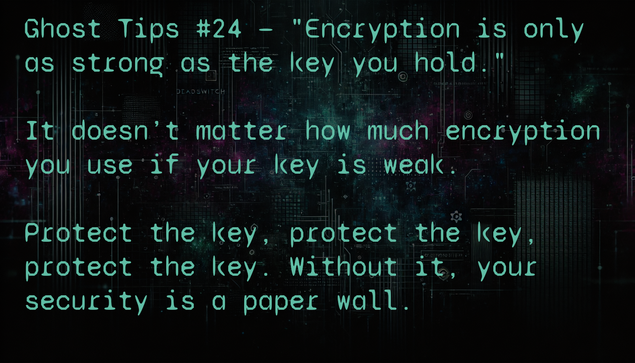#GhostTips #DeadSwitch #EncryptionIsPower #KeyManagement #ProtectTheKey #DigitalVault #OPSECFirst #CryptoMindset
#KeyManagement
The European Union Agency for the Space Program is looking for a Crypto Custodian, implementing and auditing security practices for the Galileo and secure SATCOM programs (GOVSATCOM & IRIS2).
### Applied Murphy's Laws for Cryptography (Loose Interpretation)
1. **Law of Encryption Complexity:**
The more complex the encryption algorithm, the faster someone will find a simple way to break it.
2. **Law of Limited Time:**
When there's no time to generate the perfect key, "1234" becomes the default password.
3. **Law of Trust:**
The greatest vulnerability in any cryptosystem is the person using it.
4. **Law of Privacy Illusion:**
The moment you feel completely anonymous, someone will access your metadata.
5. **Law of the Forgotten Key:**
If a private key is created and perfectly secured, you’ll lose access to it at the worst possible moment.
6. **Law of Overconfidence:**
"This algorithm is unbreakable" — until a student proves otherwise in their thesis.
7. **Developer’s Law:**
The best cryptographic solution you design will be broken by your own testing team.
8. **Law of Universality:**
The more universal the crypto algorithm, the more exposed it is to attacks on its weak points.
9. **Law of Resource Economy:**
Every cryptosystem is a compromise between security and performance, but breaking it will always be faster.
10. **Law of Government Interference:**
If your algorithm is good enough to thwart hackers, regulators will demand a backdoor.
11. **Law of the Attacker:**
Your cryptography is never too complex for a hacker, but always too complex for the average user.
12. **Law of Unforeseen Flaws:**
Every algorithm has a vulnerability, but you'll discover it only when it's too late.
13. **Law of Urgent Updates:**
The moment you deploy a new cryptosystem, its algorithm becomes outdated by current standards.
14. **Law of Retrospect:**
"No one will break RSA in our lifetime" — until quantum computers prove otherwise.
15. **Law of Entropy:**
The more complex the password, the more likely the user is to write it on a sticky note and attach it to their monitor.
16. **Law of Crypto-Anarchy:**
The more secure your system, the more it annoys governments and corporations.
17. **Law of Simplicity:**
If something in cryptography looks too simple to be broken, it's already been compromised.
18. **Key Length Law:**
The moment you double the key length, someone finds an attack that breaks both the old and new versions.
19. **Law of Paranoia:**
In cryptography, you’re either not paranoid enough or already too late.
20. **Law of the Last Test:**
The biggest vulnerability will be discovered one minute after the system goes live.
---
### **Hashtags (23):**
#MurphysLaw #Cryptography #CyberSecurity #Encryption #DataProtection #Privacy #DigitalSecurity #CryptoFails #QuantumComputing #Hacking #PasswordSecurity #CryptographicAlgorithms #CyberThreats #DataEncryption #KeyManagement #ParanoiaInSecurity #UnbreakableCode #SecurityFlaws #BackdoorThreat #ITHumor #TechAnarchy #StickyNotePasswords #QuantumThreats #cryptoinsights
Chanson des clés #keymanagement
https://yewtu.be/watch?v=e3Z4C62ZNzY
Implement Azure Key Vault to securely store and manage your sensitive keys, secrets, and certificates in the cloud, ensuring their confidentiality and integrity. #AzureKeyVault #KeyManagement
Signal under fire for storing encryption keys in plaintext
https://stackdiary.com/signal-under-fire-for-storing-encryption-keys-in-plaintext/
#Signal #Privacy #Encryption #Cybersecurity #Messaging #DataProtection #SecureComms #DesktopApp #Vulnerability #InfoSec #DigitalSecurity #EndToEnd #PlainText #KeyManagement #TechNews #PrivacyBreach #SecurityAlert #Cryptography #DataSafety #MobileApps #UserPrivacy #SecurityFlaw #EncryptionKeys #Tech #MessageSecurity #PrivacyRisk #SecureMessaging #CyberRisk #DataExposure
🔒 Encryption Monday 🔒
Cyrill Krähenbühl and Adrian Perrig, both of ETH Zurich, are authors of our study on Trends in Data Protection and Encryption Technologies. They wrote a chapter about #keymanagement.
🔑 Key management is a central part of cryptographic systems. Part of key management is the creation, secure storage, distribution, recovery, and use of keys.
📈 In particular, advances in hardware security modules and the development of low-cost as well as high-quality random number generators present opportunities for secure and affordable key management. However, challenges such as quantum resistance require new key management systems.
📡 Key management also offers potential for the military to develop new systems through cryptographic keys.
📗 Study Trends in Data Protection and Encryption Technologies: https://lnkd.in/ebjKZSZr
🔜 Stay tuned for next week's encryption technology.
#EncryptionMonday #Securepositioning #Securelocalization #DataProtection #CyberSecurity
The #SMB market lacks affordable, off-the-shelf solutions for encrypted #LTO9 backups. However, there are effective #DIY options if you have basic knowledge of encrypted filesystems and #LTFS. While self-service requires more effort, cloud providers are all vastly more expensive at scale—and often still use the same basic equipment, minus robotic tape libraries and #keymanagement capabilities. You also won't need to trust your cloud provider with secret keys, manage third-party key escrow, or courier physical tapes for large-scale ransomware recovery operations.
If you don't already have a cost-effective plan for ransomware recovery, it's never too late to start—unless you wait until after your online systems have been compromised, of course. Please don't do that!
Came over the SSH-provider of 1Password. Wouldn't recommend in terms of how it doesn't allow for using a security key or even the Secure Enclave on macOS.
Could serve well for public keys used internally due to its traceability though.
https://1password.community/discussion/127278/storing-just-public-ssh-keys
https://blog.1password.com/1password-ssh-agent/
My web application needs to have my users' private keys to sign documents on their behalf. How do I handle that?
https://security.stackexchange.com/questions/269107/my-web-application-needs-to-have-my-users-private-keys-to-sign-documents-on-the
#digitalsignature #keymanagement #cloudstorage
In a web application, what would you consider the best way to store secret keys obtained via an SDK?
https://security.stackexchange.com/questions/268917/in-a-web-application-what-would-you-consider-the-best-way-to-store-secret-keys
#secretsmanagement #webapplication #keymanagement #localstorage #iframe
How do I best share a shared account's private key?
https://security.stackexchange.com/questions/268116/how-do-i-best-share-a-shared-accounts-private-key
#keymanagement #websites #oauth
Sigh. They're called "private" keys for a reason. What part of that makes people think it's OK to just copy them willy-nilly all over the place? I really don't think it's a complicated concept.
Key management: Can I delete private key in asymmetric encryption?
https://security.stackexchange.com/questions/267581/key-management-can-i-delete-private-key-in-asymmetric-encryption
#keymanagement #keygeneration #asymmetric
Is handling keys with vps secure?
https://security.stackexchange.com/questions/267379/is-handling-keys-with-vps-secure
#keymanagement #aws #vps
Asymmetric encryption and data sharing
https://security.stackexchange.com/questions/267297/asymmetric-encryption-and-data-sharing
#keymanagement #asymmetric #python #rsa
AWS recently announced the availability of AWS Key Management Service (AWS KMS) External Key Store (XKS), allowing organizations to store and manage their encryption keys outside the AWS KMS service. #aws #keymanagement #hms https://www.infoq.com/news/2022/12/aws-kms-external-key-store/
#keyManagement is a thing, not only in IT #security
